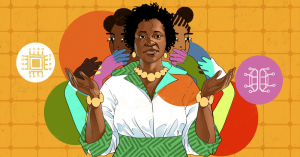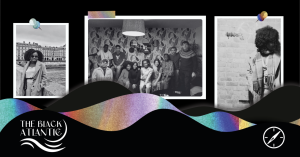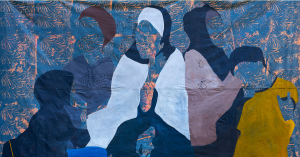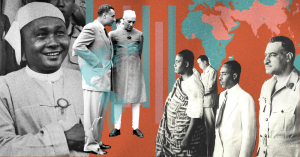EDITOR'S FOREWORD
Nigeria Imaginary
Our latest issue, Nigeria Imaginary, considers the restorative potential of Nigerian art and invites readers to explore the Nigeria Pavilion at the 2024 Venice Biennale, plus more.
COVER INTERVIEW
‘Who Do We Imagine AI Is Built By and Built For?’
With AI proponents promising to ‘save’ Africa, Nanjala Nyabola asks an urgent question: what happens when a continent’s future is outsourced to someone else’s imagination? We discuss the politics of technology, the myth of the ‘cloud’, and why the next digital revolution must begin with African women.
COVER ESSAY
Toyin Ojih Odutola’s Theories of Place
The Nigeria Pavilion at the 2024 Venice Biennale brings together artists who are diverse in their styles, influences, affiliations with place, and interpretations of nationhood and history. Among them is Toyin Ojih Odutola, whose artistic instincts already bypass easy conceptions of place, belonging and history.
COVER ESSAY
Ndidi Dike’s Thesis on the Nigerian Condition
‘Nigeria Imaginary’, the theme of the Nigeria Pavilion at the 2024 Venice Biennale, is a daring call to not just imagine Nigeria as a restored entity but to also dream its future into reality. Through Ndidi Dike, viewers experience the distinctly Nigerian desire to connect what Nigeria once was, what it is now and what it might become.
COVER ESSAY
Yinka Shonibare and the Case for Nigeria at the Venice Biennale
Through Yinka Shonibare CBE RA, the Nigeria Pavilion at the 2024 Venice Biennale presents a Nigeria that is more about routes than roots. A Nigeria that diagnoses its struggles with intricately imagined jokes while holding up a mirror to structural violence and broken promises. And a Nigeria that allows its children to return again and again in an ever-expanding array of visions and alternative futures.
THE MINISTRY OF ARTS / BOOKS DEPT.
Reading the Great Nigerian Literary Debate
For several years now, a new generation of Nigerian writers and literary scholars has been debating the meaning of Nigerian literature. Last year, we finally came close to a breakthrough.
THE MINISTRY OF ARTS / BOOKS DEPT.
Birdwoman
‘Why are they screaming? Felicity raises an arm to clear the smoke in front of her face. But her arm doesn’t rise. Instead, feathers flap.’ An excerpt from ’Pemi Aguda’s short story collection, Ghostroots.
THE MINISTRY OF ARTS / MUSIC DEPT.
The Songs of Jos
For a long time, the city of Jos has grappled with violence fuelled by religious and ethnic differences. But today, Jos is home to musicians and creative communities who are giving language to the traumas they witnessed growing up.

THE MINISTRY OF BUSINESS x THE ECONOMY
A Yoruba Woman’s Notes on Language as a Barrier, Bridge and Bedrock
‘But how disturbing it is that my own language, one filled with so much beauty and melody, would be considered foreign to me. Why did I not think in my language? Why would my default language be one that was imposed by brutal colonialists on my ancestors’ lips?’
THE MINISTRY OF CULTURAL AFFAIRS
Who Will Bury Mr. Taiwo?
It took the Nigerian government 51 years to formally honour Taiwo Akinkunmi, the man who designed the Nigerian flag. Now, months after his death, his body remains in a morgue as his family awaits a state burial.
THE MINISTRY OF HEALTH
The Menace of Skin-Bleaching in Nigeria
Cosmetic endeavours aimed at achieving lighter skin have led to the development of different skin-bleaching beauty methods that leave the body open to grave health repercussions.
THE MINISTRY OF MEMORIES
A Womanist Reading of African Women in Abrahamic Tradition
Though the presence of Abrahamic tradition within global Black consciousness often finds expression through male-dominated narratives, a closer examination uncovers Black women at the very centres of the most path-altering moments in the tradition, offering analogues with which Black women have interpreted, reimagined and reclaimed their past, present, and future.
THE MINISTRY OF POLITICAL AFFAIRS
Geopolitical Projections in West Africa and the Wider Continent
A new element in geopolitics across Africa is the growth of political consciousness and the willingness to organize against unfavourable status quos. Recent events in Mali, Niger and Burkina Faso are representative of this new phase of relations between nations, governments and myriad interest groups.
THE MINISTRY OF WORLD AFFAIRS
King Charles’ Non-Apology to Kenyans
Amidst global demands for reparations, King Charles offers Kenyans a (non)apology. But what substance can an apology from Britain hold, when its imperial and colonial crimes continue to shape and undo life in Kenya?
FIRST DRAFT
‘There Is a Battle Between Relaying Stories Thematically Versus Chronologically’ Noo Saro-Wiwa’s First Draft
Travel writer and author of Black Ghosts: A Journey into the Lives of Africans in China, Noo Saro-Wiwa, travelled to Guangzhou after reading about the African community in China.
the cover
‘Welcome to Venice,’ by Sarah N. Kanu
BUY the COVER + MORE
SPECIAL THANKS
Editors: Wale Lawal, Yusuf Omotayo, Peace Onafuye and Victoria Audu
Issue Design: Wale Lawal and Dami Mojid
Illustrators: Dami Mojid, Kevwe Ogini and Charles Owen
Funding Partners: The Museum of West African Art


































